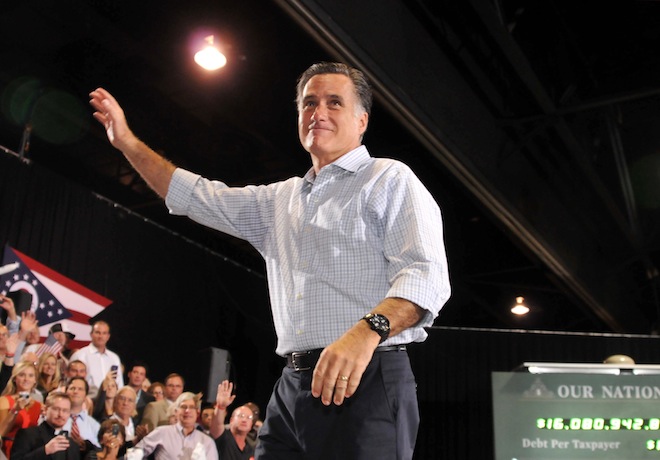In the first national poll to be conducted entirely after the opening presidential debate, former Massachusetts Governor Mitt Romney now leads President Barack Obama by 4 points.
The poll, conducted by Pew Research Center from Thursday through Sunday and released on Monday, shows Romney leading Obama among likely voters nationwide, 49 percent to 45 percent. That’s a stark contrast from Pew’s mid-September poll after both parties’ conventions, which showed Obama up 8 points among likely voters.
The dramatic 12-point swing in Pew’s poll from Obama to Romney is perhaps the strongest piece of evidence to date that the president has paid a political price for his listless performance in the Denver debate. But the complete suite of post-debate surveys from national pollsters is only beginning to emerge, and the early indications are of a less dramatic shift than what Pew is showing.
Republican-leaning Rasmussen found Romney leading by 2 points in its Saturday release, which was based on findings from the tracking period of Oct. 3-5. Â But in Rasmussen’s Monday poll, conducted entirely after the debate and partially following the release of Friday’s encouraging jobs report, the two candidates were tied again. Gallup reported on Monday that Obama and Romney were tied in the three days immediately following the debate, after Obama led by 5 in the three days prior. Â But on Monday, Gallup’s tracking — which is based on a 7-day rolling average — showed Obama with a 5-point lead.
The PollTracker Average now shows Romney overtaking Obama to claim a nearly 3-point lead after the president led for the better portion of the last month.
Pew’s survey shows voters overwhelmingly believe Romney won the debate: 66 percent said the Republican nominee performed better, compared with only 20 percent who said Obama did a better job. A separate poll released by Gallup on Monday showed that a whopping 72 percent of debate watchers declared Romney the winner, while only 20 percent said the same of Obama — the largest margin of victory in the history of Gallup’s post-debate polling.
Pew’s poll also suggests that voters have given Romney a second look following his stellar debate performance. The two candidates now run even on the question of who is the stronger leader, a category that Obama won by 13 points in Pew’s September poll. Voters still view the president as the more honest and truthful candidate by a margin of 44 percent to 39 percent, but the president had a 14 point advantage on the same question a month ago. And Obama’s 18-point lead with women shown in Pew’s previous poll is also gone, with the two candidates now tied among female voters.
In another blow to the Obama campaign, whose central message has been to move the country forward and away from the old policies put forth by Republicans, voters identify Romney as the candidate with new ideas, 47 percent to 40 percent. Moreover, Romney’s favorability rating spiked 5 points to 50 percent in Monday’s poll. Obama’s favorability rating, long his most resilient attribute as a candidate, fell from 55 percent last month to 49 percent.
On a host of policy issues — the budget deficit, the job situation, taxes, Medicare, health care and foreign policy –Â Romney has either expanded his edge from last month, overtaken the president or narrowed Obama’s edge.
Take Medicare, for example. The president was widely viewed as the better candidate to handle the nation’s health care system for senior citizens in September, 51 percent to 38 percent; today, the president’s advantage is only 3 points, 46 percent to 43 percent. Obama’s previous 15-point edge on foreign policy is now only a 4-point advantage. On taxes, Obama’s 6-point lead from last month has turned into a 4-point advantage for Romney. And a majority of voters have doubts about Obama’s ability to take on the paramount issue of the 2012 campaign: 54 percent said the president does not know how to turn around the economy, while 44 percent said he does.
Underlying all of these gains by Romney is a re-engaged Republican Party, whose rank-and-file endured a frustrating month following the national conventions. In Pew’s September poll, 73 percent of Romney supporters said they had given “a lot of thought” to the upcoming election; that number swelled to 82 percent in Monday’s release. The portion of Obama voters who said the same dipped slightly, from 69 percent in September to 67 percent in the latest poll. Additionally, Romney’s supporters appear galvanized in the wake of his head-to-head performance with Obama. Sixty-seven percent of Romney’s voters said they are “strongly” supporting the candidate, up from 56 percent a month ago. On this, Obama has neither dipped nor spiked: 68 percent of the president’s voters said they are strongly supporting him, unchanged from last month.
Pew conducted its poll Oct. 4-7 using live phone interviews with 1,201 registered voters and 1,112 likely voters nationwide. The margin of error is 3.3 percentage points for registered voters and 3.4 percentage points for likely voters.










